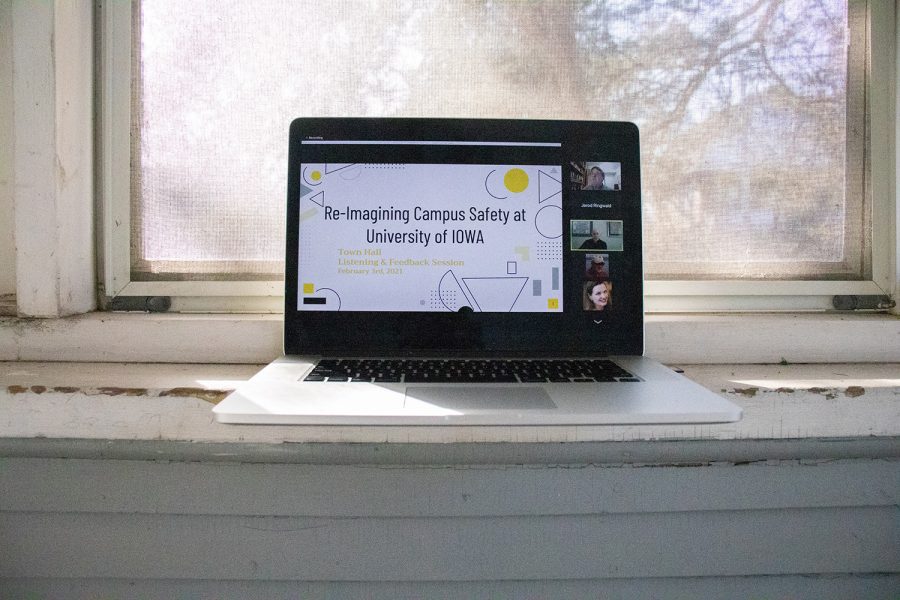Campus Health Officer: vaccine rollout slower for faculty in Iowa than in other states
Faculty Council members received various updates and presentations on sectors of campus at their Tuesday meeting.
The Faculty Council meeting is shown on Tuesday, March 9, 2021. Faculty Council met to discuss campus safety and fall 2021 semester plans, amongst other topics.
March 9, 2021
University of Iowa Campus Health Officer Dan Fick told the UI Faculty Council on Tuesday that the vaccine rollout may be a little slower for UI faculty than other universities, though campus COVID-19 cases are reaching the lowest numbers yet.
University and college faculty were not included in one of the state’s priority groups currently eligible for the vaccine. K-12 teachers and staff are eligible as part of the state’s Phase 1B, and this week is the first that the state opened up vaccination to anyone 64 years old and younger with a preexisting condition, which largely expands the vaccine eligibility.
Fick told the council members that COVID-19 vaccine rollout in Johnson County may be slower than smaller counties in Iowa. Through March, he said vaccine dose accessibility will be limited at UI Hospitals and Clinics and in Iowa.
“I understand it’s hard because we are all looking out and seeing non-health care faculty at Big 10 institutions being vaccinated,” Fick said. “That’s just the challenge we have with the current guidelines through the Iowa Department of Public Health.”
As far as testing and COVID-19 cases, Fick reported that the lowest number of self-reported UI community cases were reported last week.
“Things are going pretty good numbers-wise, we have full capacity to test people,” Fick said. “When the testing capacity cost goes down, we’re still following our guidance on who we test.”
The council also received presentations on campus security, COVID-19 testing, and the university’s fall semester plans regarding student and faculty resources, and what classrooms will look like.
Campus Safety Update
Members of the Reimagining Campus Safety Action Committee also updated the Faculty Council. While members of the committee did not explicitly back one of the three models over the others, some suggested piecing the models together to improve the UI’s security system as best as possible.
Associate Professor in the Biomedical Engineering Program James Ankrum, who is a member of the UI’s Reimagining Campus Safety Committee, said the committee is hoping to receive more faculty opinions on its models.
“We have been in the process of reevaluating how we do campus safety here at the University of Iowa and a lot of prototyping to figure out where we’ve been and where we’re at,” he said. “We’re especially interested in getting more faculty input.”
None of these models are “silver bullets”, Ankrum said, but all three models are focused in protecting the lives of marginalized individuals.
UI Hospitals and Clinics LGBTQ+ Clinic Co-Director Nicole Nisly said she liked all three proposals, but she saw issues in each proposal.
“If I could, I would have all three [prototypes] superimposed to each other,” she said. “I would encourage that many identities are identified and represented and make sure that identities that are highly policed are represented including community members.”
She said while all of the models had good intentions, the uses of dispatchers and safe spaces could be difficult to facilitate or become counterproductive over time.
Director of Health Systems and Administration in the Carver College of Medicine Lindell Joseph had a similar perspective as Nisly. She said progress has been made, but she had specific problems with the first prototype, the refocusing accountability, and retraining of campus police models.
“My only concern is potentially with a dispatcher,” she said. “I hope there is robust training for the dispatcher and the opportunity to have someone to have another person in that dispatch area to have someone to bounce things off of…so you can problem solve and make sure you’re given the right direction.”
As previously reported by the DI, the committee recently allowed the Iowa City public to comment on the proposals. The presenters reminded council members to get their feedback into the committee by March 12.
Fall 2021 Update
Associate Provost for Undergraduate Education Tanya Uden-Holman told the Faculty Council that recommendations by the UI faculty in The Future of Work@Iowa committee will aid the transition for incoming UI students next fall.
“We’re looking at developing some summer bridge programming for students,” Uden-Holman said. “Part of that would be virtual, we anticipate that it would be in the areas of science, math, and also potentially writing.”
Uden-Holman said many first and second-year students have not received the on-campus experiences of the UI because of the pandemic. She said the committee has discussed tours of campus and activities for future students included with On Iowa!.
“That’s something that is very much on our mind,” Uden-Holman said. “For our Iowa staff, and academic support and retention.”
The next Faculty Senate meeting will be on April 13.



